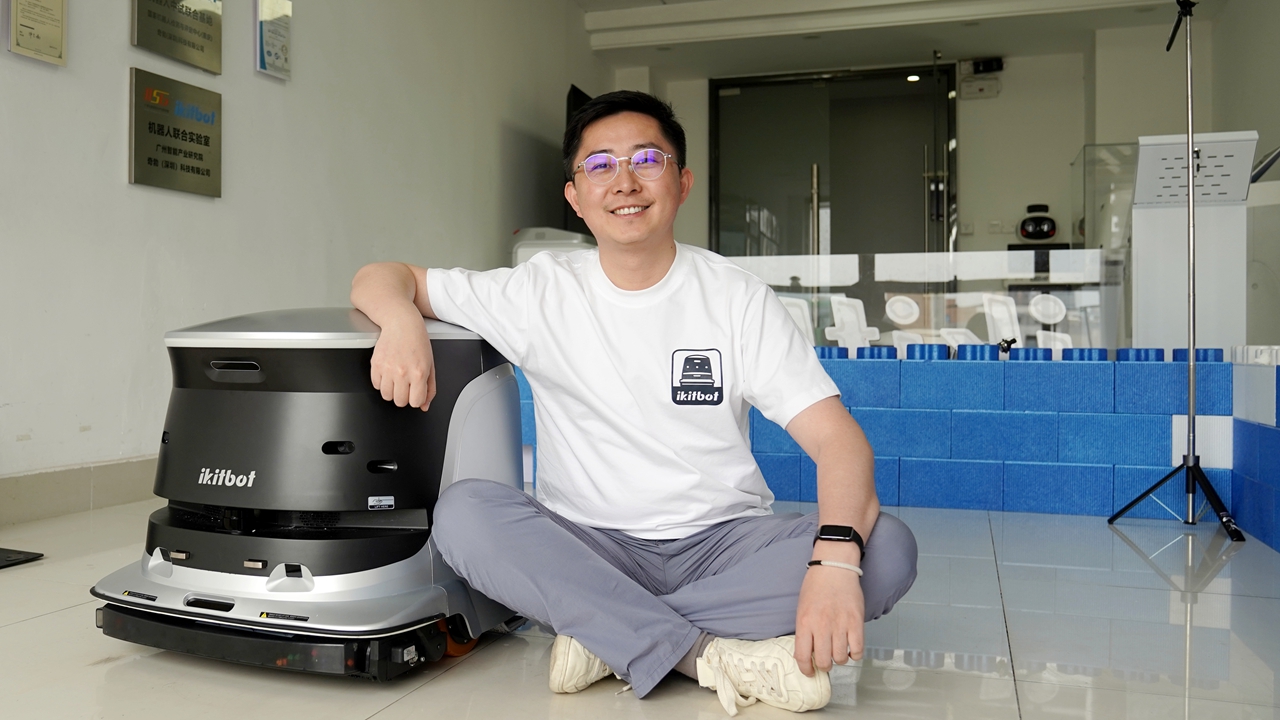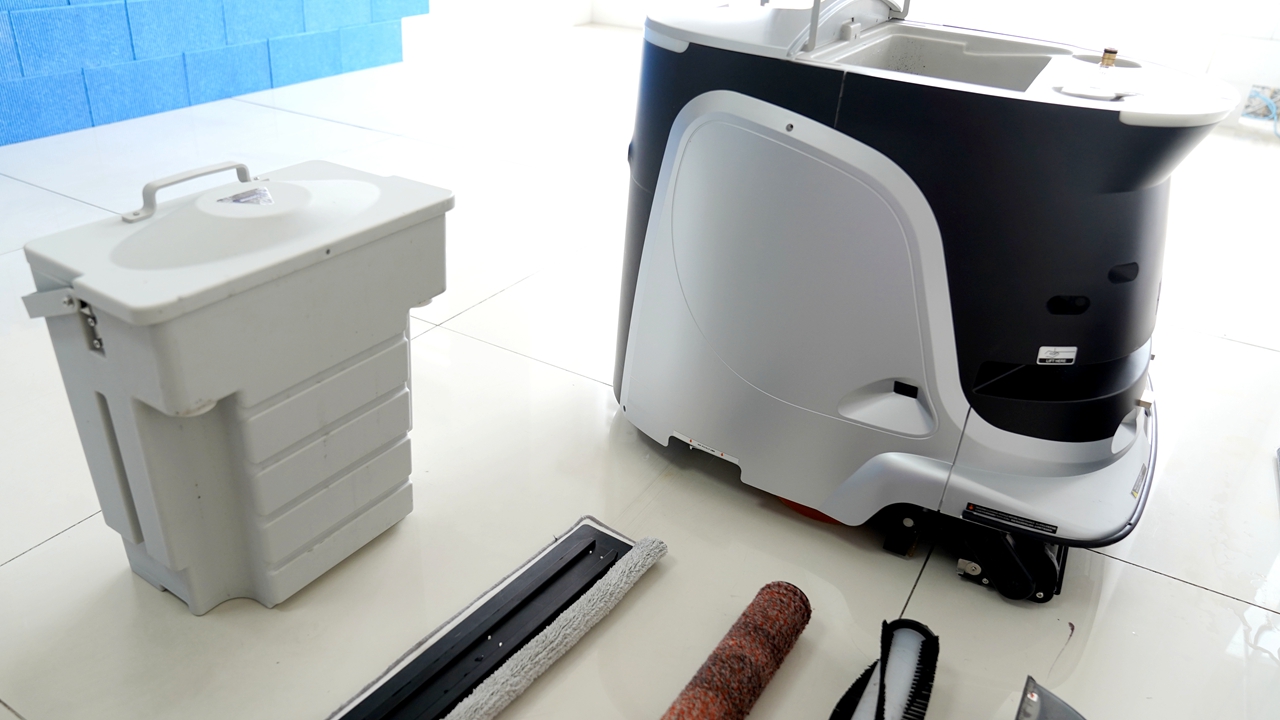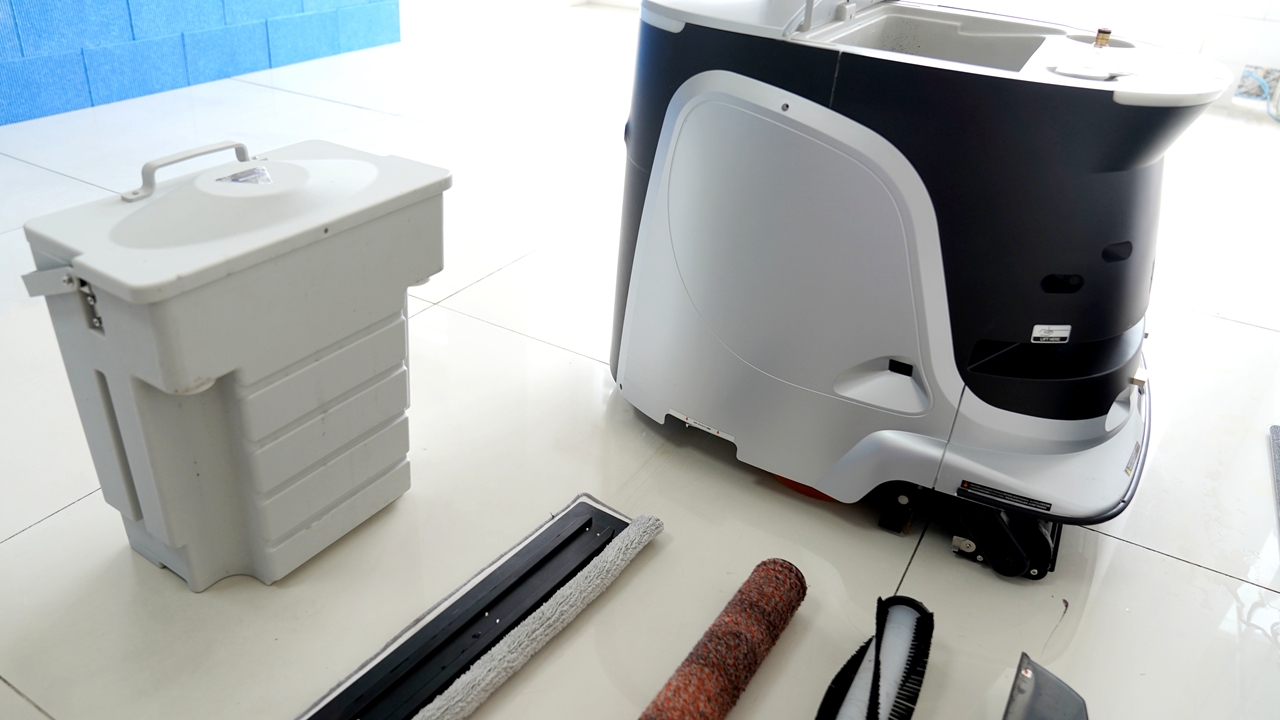iKitbot's global leap: from SZ to Japan, Europe and beyond
Writer: Li Jing | Editor: Lin Qiuying | From: Original | Updated: 2025-07-07
Video and photos by Wang Haolan
In the bustling aisles of shopping malls, the crowded corners of supermarkets, and even the confined spaces of elevators, one might encounter a large, sleek cleaning robot. While service robots engage customers with lively voice interactions, these are the unsung “silent doers.” More than just machines, they are productive allies that free human cleaners from monotonous tasks, stepping in to handle the grunt work with precision and reliability. This was precisely the vision of Wang Xuesong when he founded Shenzhen iKitbot Technology Co., Ltd. in 2021.

Wang Xuesong, founder of Shenzhen iKitbot Technology Co., Ltd., poses for a photo with his firm’s star product iKibot One.
After four years, the company is making significant inroads in the global market. Its smart iKitbot One commercial cleaning robot is winning over clients in Japan and Europe with its remarkable capabilities — it is “ultra-quiet,” “stain-busting,” “water-mark-free,” and “effortless.”
Spotting market potential
Before founding his own company, Wang worked years in the service robot industry. For 14 years, he worked at OrionStar, a world-leading provider of AI service robot solutions, and Candela Technology, a prominent service robot supplier. His extensive product engineering expertise and foresight gained from years of experience enabled him to identify an opportunity in the commercial cleaning robot industry. Labor shortages and rising costs in the traditional cleaning sector are driving companies to seek alternatives.
China now has about 100,000 cleaning companies employing nearly 14 million cleaners. Of these, around 30% focus specifically on floor cleaning. With an average annual labor cost of approximately 60,000 yuan (US$8,350) per cleaner, the market size for floor cleaning alone is estimated in the tens of billions of yuan.
Demand for cleaning services remains high. According to the Ministry of Human Resources and Social Security’s list of the top 100 “most in-demand” occupations in Q3 2022, cleaners ranked fifth. However, cleaning jobs are highly repetitive and becoming less desirable for workers. As a result, companies are increasingly turning to cleaning robots, especially for high-frequency daily tasks.
Despite the significant potential, the market penetration rate of commercial cleaning robots is less than 1%. Keenly sensing this niche opportunity, Wang founded iKitbot.
The company’s name, derived from “AI,” “kit,” and “robot,” reflects his vision: to empower the cleaning industry with AI and develop the smartest robots that liberate human laborers.

The iKitbot One cleaner and its key components.
iKitbot specializes in commercial robotic solutions for office buildings, hotels, hospitals, airports, transportation hubs, and factories. Its flagship iKitbotOne robot can cover up to 4,000 sqm, allows users to customize cleaning based on floor types and environments, operates at noise levels far lower than peers, and boasts a high wastewater recovery rate. Additionally, it dries floors while removing water stains.
Targeting foreign markets
From the outset, Wang and his team aimed for overseas markets. They selected Japan as their first target, as the country “has the world’s worst labor shortage due to a severely aging population.” As a traditional robotics powerhouse, Japan also has high public acceptance of such products.
Japanese cleaning companies struggle to recruit capable cleaners, many of whom are part-time seniors. With cleaner monthly wages nearing 15,000 yuan, labor costs have soared.
Consequently, domestic commercial cleaning robot companies such as Gaussian Robotics, Keenon, and Shenzhen-based Pudu are actively targeting the Japanese market.
However, vast market potential does not guarantee success.

The iKitbot One cleaner and its key components.
“In Japan, business partners prefer a deliberate and cautious decision-making process. They usually require extensive product testing and proven reliability before placing orders,” Wang explained.
iKitbot cleaning robots entered the Japanese market last June and have sold several hundred units so far.
The company also began exploring the European market late last year, starting with Germany and some Western European countries. “We expect to sell about 1,000 units in Europe this year,” Wang said.
“Europe wasn’t our primary target until next year, but many European clients proactively contacted us on social platforms, prompting us to accelerate expansion plans there,” he added.
Embracing a brave new world
Wang emphasized the global commercial cleaning robot market holds enormous growth potential. He is confident in the competitiveness of China-made robotic products, thanks to their cost efficiency and high performance.
According to the latest QYResearch report, the global commercial cleaning robots market is projected to reach US$1.71 billion by 2031.
His company is developing modular robots, also known as modular reconfigurable robots. These are made up of multiple interchangeable parts that can automatically connect and disconnect to form different shapes and perform varied tasks.
“Most service robots today have limited functions,” Wang said. “Cleaning robots clean; delivery robots transport.”
He explained that if a robot’s mobile base and operational components can be separated and recombined automatically, the robot could switch tasks. For example, it could clean floors before and after business hours, manage inventory in between, and even greet customers if staff are busy.
“We aim to make our cleaning robots smarter and adaptable to different scenarios, a goal we plan to achieve within the next two years,” he said.